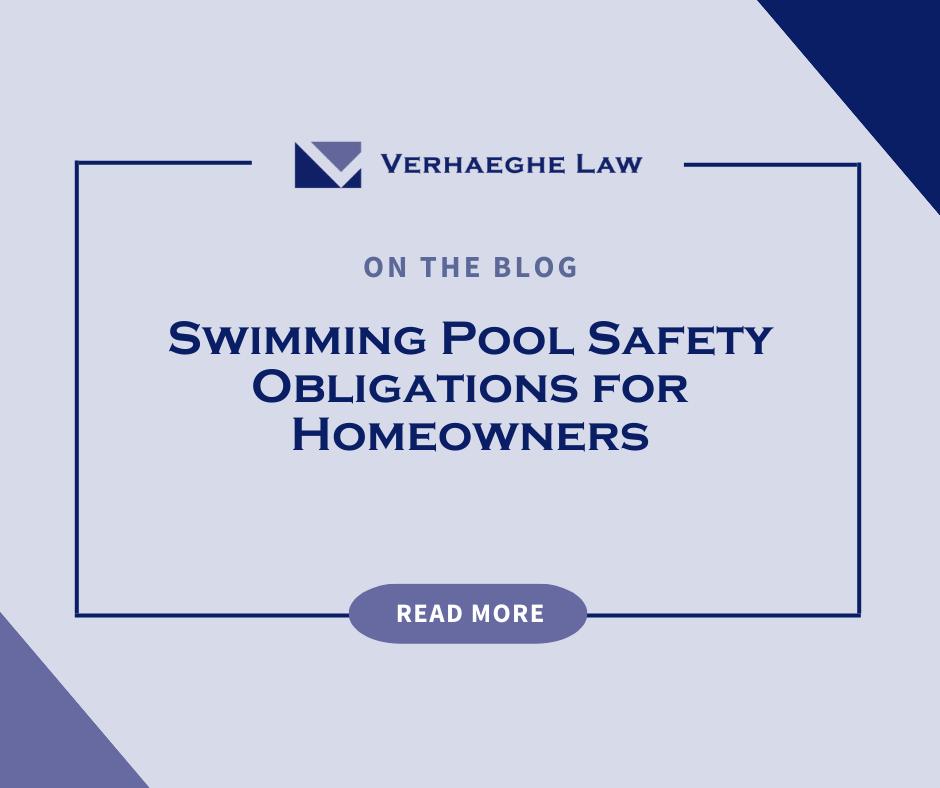Swimming Pool Safety Obligations for Homeowners

Backyard pool season is a beloved time for many Albertan homeowners and their guests. In preparation for hosting friends and family, homeowners should consider their legal obligations. Under the Occupiers’ Liability Act of Alberta, homeowners are expected to maintain their property to a reasonable standard of safety, so as to prevent potential injury to visitors.
Swimming pool accidents, which may lead to drowning, can be particularly devastating. If you or someone you love have been injured in somebody else’s backyard pool, contact our Edmonton personal injury lawyers today and learn what compensation may be available to you.
Make Sure The Swimming Pool is to Code
When building a private swimming pool in Alberta, homeowners are required to obtain a permit from their municipality. Included in this permit is an inspection, in which a professional may ensure the size, structure and location of your pool meet safety requirements. Working with licensed contractors can likewise help ensure a backyard structure has been constructed with trustworthy expertise.
Install a Fence
Alberta’s National Building Code requires all outdoor swimming pools to be protected by a fence that is at least 1.5 metres (5 feet) high. It must have a self-latching gate that is the same height as the fence, and which locks on the inside. Having a fence in place can help prevent accidental falls into the pool, and is part of a homeowner’s duty of care for guests on their property.
Maintain the Pool
Once a pool is built to code, it is the homeowner’s responsibility to maintain it to reasonable safety standards. This includes ensuring that the pH balance is adequately maintained, and that chemicals such as chlorine meet the chemical parameter standards.
Normal wear and tear can lead to the formation of cracks and hollows, which may potentially become tripping hazards. Issues with plumbing, including malfunctioning or out-of-date drainage systems, can lead to the particularly dangerous circumstance of swimmer entrapment.
Performing regular inspections and addressing issues in a timely manner can be key in minimizing the risk of injury for all backyard pool users.
Keep Safety Equipment On Hand
Having pool safety equipment nearby in the event of an injury can help prevent serious consequences. This may include floatation devices, such as pool noodles and inflatable floats, available to guests at any time. Having a life ring on hand can also be helpful - in the event that someone is in need of help in the water, a person may be able to help from the deck. Having a well-stocked and easily accessible first aid kit can likewise be of help in the immediate aftermath of an injury.
Keep an Eye on Guests
A party host may be responsible for the activities that take place on their property, particularly when it pertains to children. If there are children on the premises, the owner or occupier owes a duty of care to take reasonable precautions in ensuring their safety. This involves making sure children are being supervised by responsible adults while in and around the pool.
Consuming alcohol and other intoxicants are a common occurrence at backyard pool parties, and may contribute to heightened risk. Altered states of mind may lead to poor decision-making, which can cause injury not only for the intoxicated individual, but also for others. Keeping an eye on your guests’ consumption of alcohol and/or drugs may help to prevent injuries on your property.
Contact Our Edmonton Personal Injury Lawyers Today for a Consultation
It can be challenging to know what to do when you or someone you love have been injured on somebody else’s property. Our team of Edmonton personal injury lawyers are dedicated to helping you understand your legal rights and get you the compensation you deserve. Contact us today to schedule your consultation, and learn how Verhaeghe Law may be of service to you.
** Please note, this article is intended as a general overview on the subject of occupiers’ liability, and is not intended to be legal advice. If you are seeking legal advice, please consult with an Alberta personal injury lawyer.
